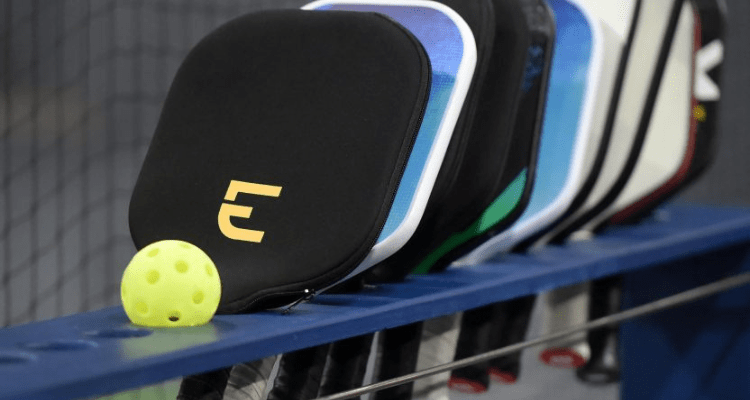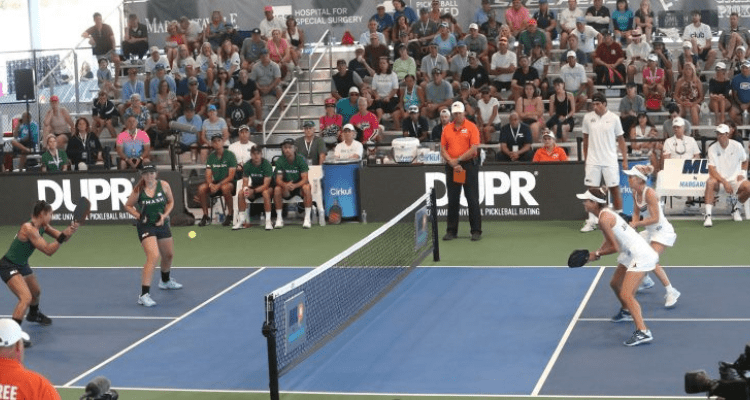The professional pickleball scene is like to an HBO drama, complete with free spending, competing leagues on the verge of collapse, and celebrity investors.
The world of professional pickleball has exploded in recent years, bringing with it big money, fierce rivalries, and even some celebrity interest. Once seen as just a casual backyard game, pickleball is now one of the fastest growing sports in America. And as its popularity rises, so too do the stakes.

Big Money Flowing In
In 2021, the creation of two rival leagues – the APP Tour and the MLP – kickstarted the professional pickleball scene. Money quickly followed, with huge investments from rich backers eager to capitalize on the sport’s growth.
Today, top athletes can earn up to $100,000 in a single tournament. Last year’s APP Tour Championship handed out $319,000 in prize money, while the MLP will distribute over $2 million across its 2023 season. Expect those numbers to skyrocket even higher as participation and viewership rapidly rise.
The influx of money has led to bigger sponsorships as well. Pickleball stars like Ben Johns and Anna Leigh Waters have landed deals with brands like Hyundai, while gear companies like Selkirk Sport and Paddletek are shelling out big bucks for endorsement contracts.
Even major networks want in on the action, with CBS Sports signing a deal to broadcast MLP tournaments through 2024. As ESPN’s Jay Posner noted, “there’s clearly an appetite for as much pickleball as TV executives can squeeze onto their air.”
Rival Leagues Breed Controversy
But with bigger money often comes bigger problems. The emergence of the two competing professional tours has sparked some tension, controversy, and even lawsuits.
The APP or MLP tour has forced many top players to pick sides, compelling them to sign exclusive contracts. These deals prohibit them from playing in events held by the rival league – limiting competition and preventing true head-to-head showdowns between the sport’s best.
There’s also been some questionable player poaching between the warring tours, with accusations of broken agreements and tour-jumping for bigger paydays.
Most recently, MLP has filed an antitrust lawsuit against its rival and the Professional Pickleball Association, alleging that restrictive player contracts and coercion of tournament venues amounts to unfair monopoly practices.
These legal battles and rivalry tensions may continue to put a damper on the sport as it tries to present a more polished and professional face to attract sponsors and fans.
Celebrities & Retired Pros Flock to the Sport
Apart from the warring leagues and competitive drama amongst current professionals, pickleball is also drawing interest from some very big celebrity names.
Iconic popstar Billie Eilish has been spotted playing recreationally in her downtime. Other musicians like The Chainsmokers, Bad Bunny, and Diplo have also picked up paddles. Rapper YG hosted his own pro-am style pickleball event last year.
Several former NBA stars and NFL players who have retired have entered the game on the athletic side. All-star point guard Dwayne Wade has shared his newfound passion for pickleball across social media. Ex-NFL quarterback Drew Brees is now part-owner of the APP Tour.

Other retired sports figures diving into pickleball include former Cleveland Cavaliers forward Channing Frye, Olympic skier Lindsey Vonn, and LA Lakers center Andrew Bynum.
The influx of big names from the music, acting, and traditional sports worlds has brought greater visibility and credibility to the blossoming professional pickleball scene. As the game continues gaining traction, even more high-profile celebrities are expected join in on the popular new craze.
Rapid Growth Brings Pains & Promise
In many ways, professional pickleball is now dealing with the same growing pains seen in more established sports leagues like golf, tennis, and auto racing in decades past. Rival tours, big money sponsors, player egos, lawsuits, and calls for regulation are all common themes.
But most analysts believe this turmoil is just part of the natural maturation process for any up-and-coming sport thrust into the mainstream spotlight. The soaring investments, viewership numbers, and celebrity interest speak to the incredible potential that pickleball holds as it develops its identity and place in the American sports pantheon over the next decade.
If organizers can contain conflicts, enhance governance, and present a more unified public face for professional pickleball, the future remains exceedingly bright. Prize purses, TV deals, and perhaps even franchise leagues likely await in the years ahead.
Like the paddles it’s played with, pickleball has two sides coming together to create something beautiful. And the resulting momentum continues propelling this unlikely sport raised from backyard origins towards major league heights. Game on!



